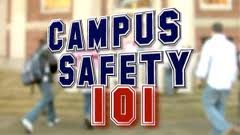This week, the news stories from the University of Virginia told of the tragic story of Yeardley Love: murdered by an angry ex-boyfriend. In September a Yale graduate student was murdered on campus the day she was scheduled to marry. In August, a University of Tampa student, Ryan McCall, was gunned down on his way home from a friend’s birthday celebration. And in March, NYU student Michael Finney drowned while on spring break.
Parenting on good days can be frightening. You never know when some unexpected event will occur and rock your world. It’s impossible to prepare for every unexpected occurrence, but we can take the time to equip our children with the knowledge and the tools they need to keep themselves from falling into dangerous situations.
Here are my 6 campus safety talking points:
- Teach them the warning signs of violent, aggressive behavior. Help them understand that if a friend or boyfriend starts exhibiting violent or possessive tendencies, they need to seek help.
- Help them to understand that safety should be a priority. Girls should NEVER walk alone on or off campus, especially at night.
- Impress upon them that alcohol often leads to dangerous, aggressive behavior. Sexual assaults, violence and sheer stupidity (driving while drunk) can ruin their lives or lead to fatal consequences.
- Talk to them about putting themselves in compromising positions: alone with a guy or girl they don’t know; flirting when they have no intention of pursuing a relationship; participating in illegal activities that could escalate.
- Work with them to come up with some safety guidelines BEFORE they leave for college (lock their dorm door at night; call for a campus escort when alone; program emergency numbers in their cellphone; read the school’s emergency plans together).
- Let them know that they should never be afraid to ask for help when frightened, threatened, or unsure of their own safety.
We can’t hold our childrens hands their entire lives. But we can be responsible parents and teach them the rules of safety. We did it for them when they were toddlers: look both ways when crossing the street; hold your brother’s hand at the mall;don’t talk to strangers. We should certainly do that for them BEFORE they head off to college.
If you liked this article, you might like:
10 Concepts your teen should learn BEFORE college

